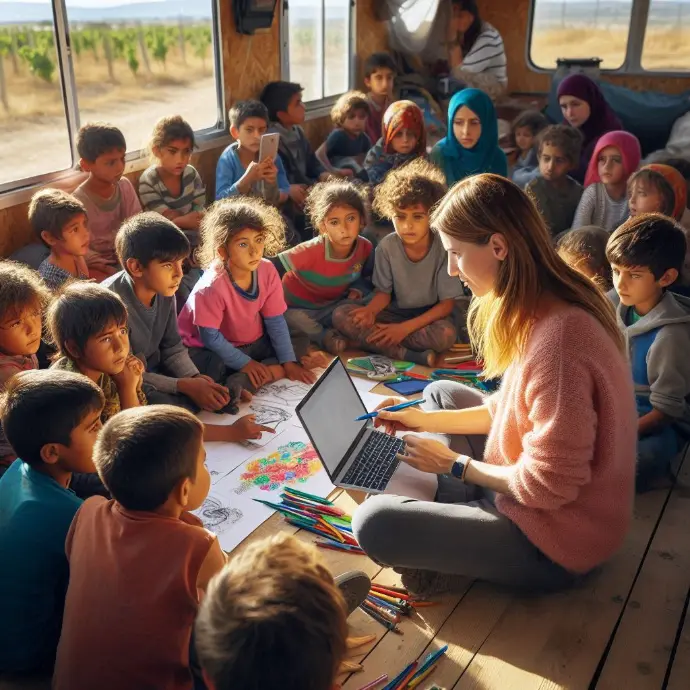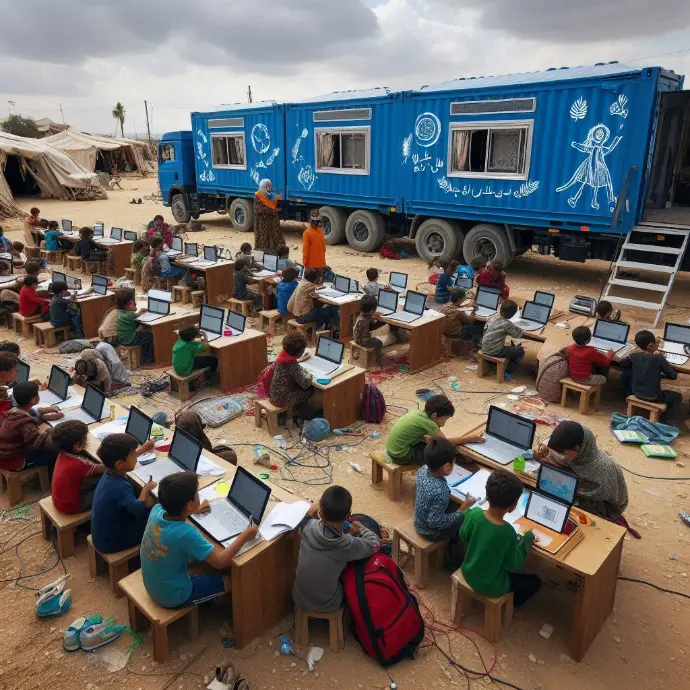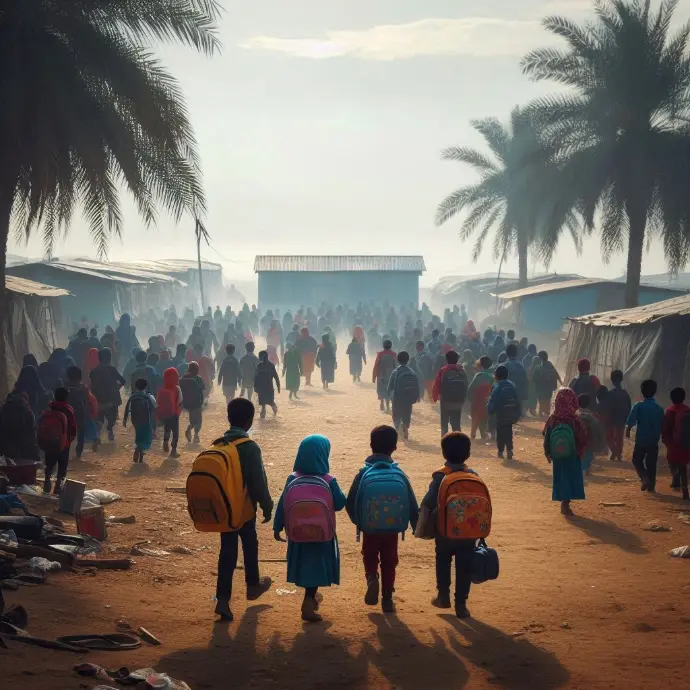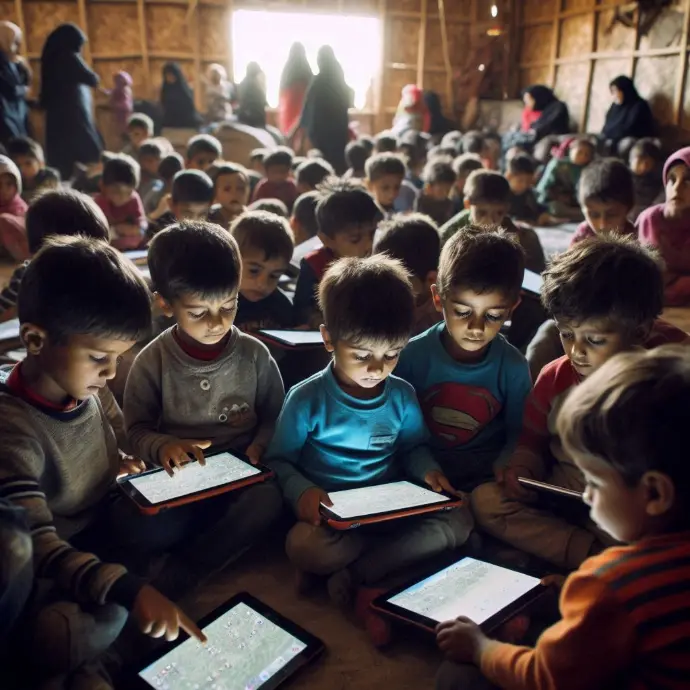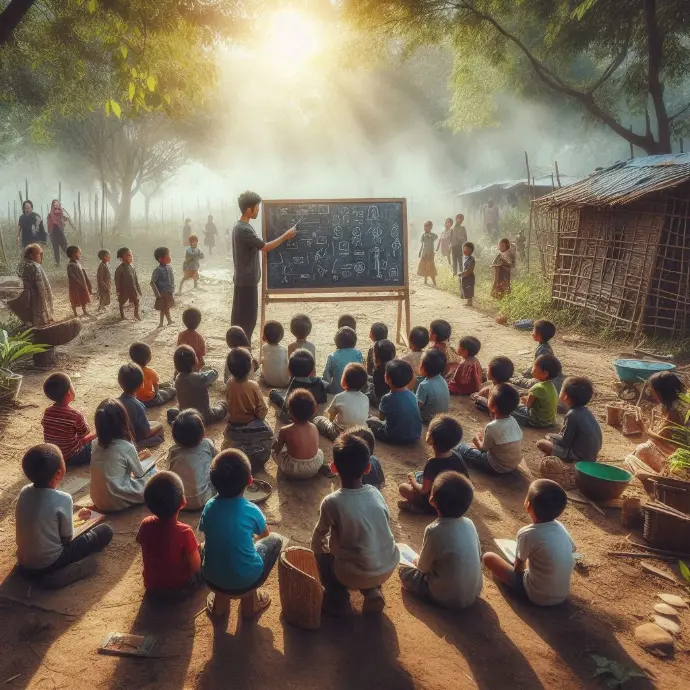The Future in a Backpack: The Importance of Mobile Education for Displaced Children
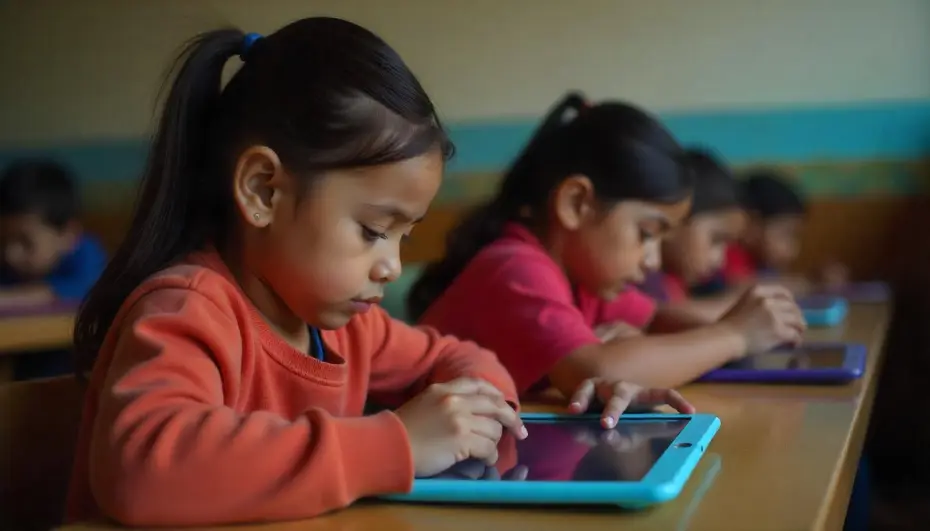
On our website, we delve into a comprehensive analysis of global human rights. This time, we'll explore the importance of mobile education for displaced children in our feature article, "The Future in a Backpack." Get ready to discover how this innovative tool is transforming the lives of thousands of children in conflict situations. Don't miss this revealing research and delve into the fascinating world of human rights!
Introduction
Armed conflict has a devastating impact on the education of displaced children around the world. Violence, the destruction of educational infrastructure, and the instability generated by conflict prevent many children from accessing quality education. According to UNICEF, an estimated 104 million children and young people are affected by a lack of access to education due to armed conflict.
Furthermore, forced migration resulting from these conflicts often leads to the interruption of children's education, creating a void in their lives and making it difficult for them to acquire essential skills for their future. The lack of education also puts them at greater risk of recruitment by armed groups and labor exploitation.
In this context, mobile education is presented as an innovative and effective solution to ensure that displaced children have access to meaningful educational opportunities, despite the challenging circumstances in which they find themselves.
Mobile education has become a fundamental pillar in providing access to education for displaced children, allowing them to continue learning even in highly mobile environments with limited resources. Through mobile devices and digital technologies, children can access educational content, learning resources, and connect with trained teachers, regardless of their geographic location or displacement status.
The flexibility offered by mobile education allows learning to be adapted to the changing realities of displaced children, giving them the opportunity to develop key skills, foster resilience, and continue their academic development, despite the adversities they face.
Furthermore, mobile education not only focuses on academic aspects but also promotes the emotional and psychological well-being of displaced children, providing safe spaces for learning, creative expression, and socio-emotional support, which is critical for their holistic development in humanitarian crisis contexts.
Mobile Education for Displaced Children: A Comprehensive Approach
Mobile education is presented as a crucial tool for ensuring access to education in mobility settings, such as for children displaced by armed conflict or natural disasters. These children face significant challenges in accessing traditional education, and this is where mobile education becomes relevant. Being portable and adaptable to different contexts, it allows displaced children to continue their learning flexibly, regardless of their geographic location or disruptions to their daily lives.
Mobile education not only facilitates access to formal education but also provides the opportunity to learn practical skills relevant to their situation, which contributes to their holistic development and offers them tools to face the challenges they face in mobility settings.
Furthermore, mobile education can be a source of stability and normalization in the lives of displaced children, providing them with a sense of continuity and belonging despite the adverse circumstances they face.
Technological innovations have revolutionized mobile education, offering interactive resources, educational applications, online learning platforms, and mobile devices that allow displaced children to access high-quality educational content from anywhere. The use of mobile devices and wireless technology has opened up a range of possibilities for bringing education to remote or constantly moving communities.
Virtual reality, gamification, and adaptive learning are some of the technological innovations being leveraged to enrich the educational experience of displaced children by offering them a stimulating and personalized learning environment.
Furthermore, online collaboration and virtual support networks allow displaced children to connect with other students, educators, and educational resources around the world, thus broadening their horizons and fostering a sense of global community.
Despite its benefits, the implementation of mobile education for displaced children faces significant challenges and barriers. The digital divide, lack of reliable connectivity, shortage of suitable mobile devices, and the need for teacher training in the use of educational technologies are some of the obstacles that must be overcome to ensure that mobile education is effective and equitable.
Furthermore, the safety and privacy protection of displaced children in digital environments are important concerns that must be addressed to ensure they can access mobile education safely and securely.
Collaboration between governments, non-governmental organizations, technology companies, and the education community is critical to overcoming these challenges and ensuring that mobile education is an accessible reality for all displaced children, providing them with the tools and opportunities they need for a brighter future.
Mobile education has a significant impact on the social and emotional well-being of displaced children. By providing access to education despite adverse circumstances, it provides them with a sense of normalcy and stability amidst uncertainty. Mobile education also allows them to maintain connections with other children and teachers, which contributes to their social and emotional development, providing them with a sense of belonging and community in what can be a hostile and unfamiliar environment.
Furthermore, mobile education offers displaced children the opportunity to develop skills to cope with the stress and trauma they have experienced. By participating in educational activities, children can find an outlet to express their emotions, develop coping skills, and regain a sense of control over their lives. This can have a positive impact on their emotional well-being and their ability to adapt to the difficult circumstances they find themselves in.
Furthermore, mobile education can play a crucial role in reducing the social isolation that displaced children often face. By participating in educational activities, they have the opportunity to form friendships, share experiences, and build supportive relationships, which can be critical to their emotional health and resilience.
Current Policies and Programs
Government programs and initiatives from international organizations play a crucial role in providing mobile education for displaced children around the world. Governments and international agencies have implemented programs that seek to guarantee access to education for children forced to flee their homes due to conflict, humanitarian crises, or natural disasters.
At the governmental level, some countries have established policies that recognize the right to education for displaced children, providing financial support and resources for the implementation of mobile education programs. Likewise, organizations such as UNICEF, UNHCR, and Save the Children have led significant efforts to provide access to education for displaced children, whether through mobile schools, distance learning programs, or the integration of technology into the educational process.
It is essential to conduct a comprehensive analysis of the effectiveness of these programs, assessing both their geographical reach and their impact on the education and well-being of displaced children. Furthermore, coordination between government programs and international organizations is necessary to ensure a comprehensive and effective response to the educational needs of this vulnerable population.
The Role of Mobile Education in the Protection of Human Rights
Mobile education represents a powerful tool for the empowerment of displaced children, as it provides them with the opportunity to access quality educational content, regardless of their geographic location or mobility status. Through mobile devices and online learning technologies, displaced children can continue their education, expand their knowledge, and develop key skills for their future.
This access to mobile education not only provides them with academic knowledge but also gives them a sense of control over their own learning, strengthening their self-esteem and self-confidence. In this way, mobile education becomes a fundamental tool for the empowerment of displaced children, allowing them to envision a future full of possibilities despite the difficulties they have faced.
As Nelson Mandela said, "Education is the most powerful weapon which you can use to change the world," and mobile education is presented as a vital resource to empower displaced children and prepare them to lead change in their communities and the world.
Mobile education not only contributes to the individual development of displaced children but also plays a fundamental role in the social integration of these groups into their new communities. By providing them with access to educational resources through mobile devices, their participation in educational activities is encouraged and they are offered the opportunity to connect with other students, both local and from similar backgrounds.
This social interaction through mobile education promotes the building of positive relationships between displaced children and their peers, facilitating their integration into school and community settings. Furthermore, by accessing diverse and enriching educational content, displaced children have the opportunity to share their own experiences and perspectives, enriching intercultural dialogue and promoting mutual understanding.
In this sense, mobile education not only acts as a means of acquiring knowledge but also becomes a bridge for social integration, fostering diversity, respect, and collaboration between displaced children and their host communities.
Mobile education plays a crucial role in combating the discrimination and exclusion that displaced children often face. By providing them with access to educational opportunities through mobile devices, they are given the opportunity to develop skills and knowledge that will allow them to challenge stereotypes, overcome barriers, and break cycles of marginalization.
Furthermore, by empowering displaced children through mobile education, they are provided with tools to confront and challenge discrimination, promoting greater equality of opportunity and the recognition of their fundamental rights. This access to mobile education allows them to strengthen their voice and their ability to advocate for themselves, contributing to building more inclusive and equitable societies.
Mobile education not only represents a means of acquiring knowledge, but also stands as a powerful tool for overcoming discrimination and exclusion, promoting equal opportunities and the full exercise of human rights for displaced children.
Conclusions
Mobile education for displaced children represents a powerful tool for offering educational opportunities to those in situations of forced mobility. This innovative approach not only provides them with access to education but also allows them to maintain a degree of academic stability despite the adverse circumstances they face. By providing displaced children with the opportunity to continue their learning flexibly, mobile education significantly contributes to their holistic, emotional, and intellectual development.
Furthermore, mobile education for displaced children fosters resilience by allowing them to adapt to changing environments and continue their education regardless of the difficulties they face. This educational modality not only provides them with academic knowledge but also teaches them survival, adaptability, and problem-solving skills—critical elements for facing the challenges that arise when living in displacement.
Mobile education for displaced children not only represents an opportunity to acquire knowledge but is also an invaluable means of promoting their emotional well-being, adaptability, and resilience amid the adverse circumstances they face.
While mobile education for displaced children offers numerous benefits, it also faces significant challenges. The lack of access to mobile devices and connectivity in certain regions, as well as the need for specialized teacher training in this type of education, are obstacles that must be addressed to ensure that all displaced children have the opportunity to access this type of learning.
On the other hand, there are exciting opportunities to expand and improve mobile education for displaced children. Collaboration between humanitarian organizations, governments, and technology companies can drive the development of more accessible and effective mobile education platforms, as well as specialized teacher training programs in mobile education. Furthermore, investment in connectivity infrastructure in areas of displacement will contribute to bridging the digital divide and expanding the reach of mobile education for displaced children.
Mobile education for displaced children presents significant challenges, but also offers exciting opportunities to improve access to education in displacement contexts. By addressing these challenges and capitalizing on these opportunities, we can ensure that mobile education continues to be an invaluable tool for the development and well-being of displaced children around the world.

 IHRO NEWS
IHRO NEWS